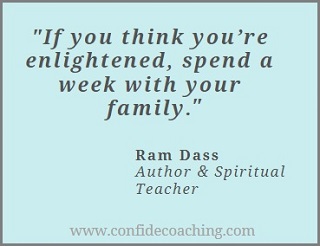Difficult relationships are never fun. When they are with your family members, they can be even less of a pleasure.
[VIDEO TRANSCRIPT]:
It’s definitely not an uncommon thing to have difficult family members that you have to deal with, so one of the perspectives that I work with quite a bit helps to get along better with that difficult sibling or that difficult parent and so the perspective kind of looks like this:
Compassion
We give a lot of people compassion when they’re physically disabled; that they’re not physically capable of doing certain things, right? I mean, we’re very quick to say “oh okay, this this person is missing legs and they’re not going to be a marathoner, right?”
When people are emotionally disabled, we don’t give them the same pass. We have this expectation of what they should and shouldn’t be able to do or say, and we get really frustrated and hurt when they don’t do them.
The New Perspective
So the reframe here is, imagine you’re on a basketball court and you’ve got a basketball, and you’re with somebody there who has no arms. And you’re throwing the basketball to them saying “come on man, let’s play! Let’s play some one-on-one! Let’s play some one-on-one!” If somebody saw this situation, who’s the jerk? I mean, you’re the jerk. You’re constantly pushing this person to do something that they’re not capable of doing.
So when you look at this difficult family member, this sibling or a parent, try to view them as emotionally disabled–that they’re incapable of doing the action or saying the thing that you’re demanding that they say or do. Things will be a lot more peaceful.
You know, the way Byron Katie puts it is,
“it only takes one person for peace, and that person has to be you”
–that the other person doesn’t have to do anything else, in order to have more peace in that relationship. So I’ll give you a a personal example.
A Personal Story of Difficult Relationships
A personal example in my life is a conversation that repeats over and over again probably a couple times a year with my father. And the conversation goes like this: my father will say “Hey Paul, how are you doing? How’s your coaching thing going? I’ve been doing this for–I’m in my second decade of coaching but he still calls it my ‘coaching thing.’ And I’ll say something like, “oh, you know, it’s going great! I just picked up this new client–he’s a business owner, he has a recruiting company.” And my father will say, “A recruiter! Maybe he can get you a job!”
And you know, 10 years ago that would really hurt, and I’d be really angry, and I’d probably tell him off, and say “you know, this is my life and my business and this is what I want to be doing!”
Practicing Acceptance
Now it’s just funny. Because I’ve accepted that he’s not going to view my life the way that I view it. He’s not capable of viewing things the way that I see them. And for him, he’s looking at what’s prestigious. He wants to look like a good father, and in his world–he’s not even a baby boomer he’s a little older–in his world, you’re a good parent if your kid does something safe like accounting or engineering or medicine, and then they get a job and a very well-known company and they work there for 30 years.
 Now you and I both know that this formula doesn’t really work anymore. It’s very rare in today’s world. And people switch jobs maybe five or six times in their career–they might even switch careers completely or they may be relocated. But my father’s view of the world is still very limited. So he’s not able to see entrepreneurship the way I do. He sees it as something very risky, and if your child is doing something very risky–even if he’s 47 years old–then he looks somehow not like a good father.
Now you and I both know that this formula doesn’t really work anymore. It’s very rare in today’s world. And people switch jobs maybe five or six times in their career–they might even switch careers completely or they may be relocated. But my father’s view of the world is still very limited. So he’s not able to see entrepreneurship the way I do. He sees it as something very risky, and if your child is doing something very risky–even if he’s 47 years old–then he looks somehow not like a good father.
So it’s his own issues and his own limitations that are are being imposed on me in this situation. So by accepting that he is who he is and he’s that way permanently, it doesn’t hurt me, and the last thing in the world my father is going to stop being is my father.
Adjust Your Expectations with Difficult Relationships
So when you have the expectation that people will continue acting and saying the way they always have, and you don’t have this expectation they should start behaving differently, then everything’s a lot lot more peaceful in your life. Your Thanksgiving dinner will be better, your Christmas dinner, your Hanukkah celebration–whatever you’re celebrating. When you get together with relatives, it’ll be so much easier when you accept the limitations that that person has.
Thank you so much for watching. If you like this video, please give me a subscribe or you can drop some comments down below.
p.s. – Have some difficult relationships to navigate? Book a FREE trial session and let’s have a chat.

Paul Strobl, MBA, CPC
Owner of Confide Coaching, LLC
Paul is a Master Life Coach for GenX and GenY executives and business owners. Originally from Houston, Texas, he has been location independent for most of his adult life. He currently resides in the Rhodope Mountains of Bulgaria near the Greek border with his brilliant wife, 14-year-old stepson (officially adopted in 2021!) and a Posavac Hound rescue.

